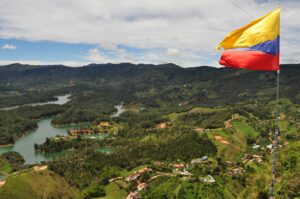To qualify for Colombia’s Independent Means Visa, applicants must show a stable passive income typically from pensions, dividends, or rental income amounting to at least three times the Colombian minimum monthly wage.
The Independent Means Visa in Colombia is ideal for financially self-sufficient individuals who want to live in the country without working or investing in a business.
This article covers key topics including:
- How do you qualify for a rentista visa in Colombia?
- How do you qualify for a pensionado visa in Colombia?
- How do you qualify for an independent professional visa?
- How do you get a residency visa?
My contact details are hello@adamfayed.com and WhatsApp +44-7393-450-837 if you have any questions.
The information in this article is for general guidance only. It does not constitute financial, legal, or tax advice, and is not a recommendation or solicitation to invest. Some facts may have changed since the time of writing.

What are the different types of visas in Colombia?
- Visitor (V) visa: Designed for short-term visits, this visa covers tourism, business meetings, medical treatments, and participation in academic or cultural events. It typically allows stays of up to 180 days per calendar year.
- Migrant (M) visa: Aimed at individuals seeking long-term residence, this category includes retirees, spouses of Colombian citizens, investors, and those with independent income. It allows multiple entries and renewable stays of up to three years. It includes various subcategories such as:
- M Pensionado visa – for retirees receiving a stable pension from abroad.
- M Rentista visa – for individuals with passive income from foreign sources like rent or investments.
- M Independent Professional visa – for freelancers or self-employed individuals with international clients.
- Other M visa types include spouses of Colombian citizens, investors, employees, and students.
- Resident (R) visa: This is for individuals who have held a valid M visa for five consecutive years or who qualify through special circumstances, such as being the parent of a Colombian child or spouse of a Colombian citizen. It offers indefinite stay and is a key step toward citizenship.
What is the independent means visa in Colombia?
The Independent Means Visa in Colombia is classified under the Migrant (M) category and is designed for foreign nationals who can prove consistent income from non-employment sources abroad.
It includes three main subtypes depending on the source of income: pensionado (retiree), rentista (passive income), and independent professional.
Sources can include pensions, dividends, rental income, or annuities.
As of 2025, the minimum required income is at least 10 times the Colombian minimum monthly wage, which is approximately COP 14,235,000 per month (about USD 3,300 depending on exchange rates).
This visa is typically issued for 1 to 3 years and can be renewed. After 5 years of continuous stay, it can lead to permanent residency.
What are the visa requirements for Colombia?
Each type of independent means visa in Colombia has slightly different documentation requirements.
1. Pensionado Visa (Retiree)
- Valid passport with at least six months of validity
- Proof of monthly pension income of at least three times the Colombian minimum wage (updated annually)
- Official pension certificate or letter, apostilled and translated into Spanish
- Bank statements showing consistent pension deposits (may be requested)
- Health insurance valid in Colombia
- Passport-sized photos
- Completed visa application form
- Visa fee
2. Rentista Visa (Passive Income)
- Valid passport
- Proof of monthly passive income from abroad equal to or exceeding 10 times the Colombian minimum wage
- Documentation (rental contracts, dividend reports, investment income records), all apostilled and translated into Spanish
- Bank statements confirming consistent receipt of income
- Health insurance valid in Colombia
- Recent passport-sized photos
- Completed online application form
- Visa fee
3. Independent Professional Visa
- Valid passport
- Contracts or letters from international clients, showing regular income (minimum required income is generally 10x the minimum wage)
- Professional qualifications or degrees (apostilled and translated)
- Income proof through bank statements
- Health insurance valid in Colombia with at least USD60,000 coverage
- Passport-sized photos
- Completed online application form
- Visa application fee
Note: All foreign documents must be apostilled in the issuing country and translated into Spanish by a certified translator recognized in Colombia.
Errors or missing certifications are a common reason for delays.
How much is residency in Colombia?

Here’s a rough breakdown:
- Visa application fee: USD 50–60, paid when you submit your application online.
- Visa issuance fee: USD 180–210, payable upon approval of your visa.
- Document apostille and translation: USD 100–300, depending on how many foreign documents need legalization and certified Spanish translation.
- Health insurance: USD 400–700 annually, depending on the provider and coverage level. Proof of valid health insurance is mandatory.
- Legal or visa consultancy services (optional): USD 500–1,000 if you choose to hire a local immigration lawyer or facilitator to streamline the process and ensure compliance.
Colombia remains one of the most cost-effective countries in Latin America for expats.
Not only are the visa-related costs manageable, but the overall cost of living is significantly lower than in North America or Europe, making it an attractive destination for retirees and digital nomads seeking long-term residency.
Can I apply for a Colombian visa online?
Yes. Colombia has an online visa application system managed by the Ministry of Foreign Affairs.
Applicants must:
- Fill out the digital form
- Upload required documents
- Pay the application fee online
- Wait for the decision (usually within 5–10 business days)
Visa interviews are generally not required unless requested.
How long does it take to get residency in Colombia?
If you’re applying for a Migrant (M) visa based on independent means such as pension, rental income, or self-employment, the initial processing time is usually between 2 to 4 weeks from the date of online submission.
However, delays can occur due to incomplete paperwork, document verification, or high application volumes.
It’s essential to ensure all supporting documents are correctly apostilled, translated into Spanish, and submitted according to Colombia’s Ministry of Foreign Affairs requirements to avoid setbacks.
Once approved, the M visa is typically valid for up to 3 years, allowing multiple entries and extended stays.
Benefits of Independent Means Visa in Colombia
- No local employment needed: This visa is perfect for retirees, digital nomads, or individuals living off investments or rental income. You don’t need to work for a Colombian employer to qualify.
- Low cost of living: Cities like Medellín, Pereira, and Bucaramanga offer a comfortable lifestyle on a modest budget, with access to modern amenities, quality healthcare, and affordable housing.
- Pathway to residency: The visa allows you to transition to permanent residency after five years, eventually opening the door to Colombian citizenship if desired.
- Cultural vibrancy: From the Caribbean coast to the Andes, Colombia offers a diverse climate, friendly locals, world-class coffee, and a dynamic mix of traditional and modern living.
Disadvantages of Independent Means Visa in Colombia
- Income threshold fluctuates: The monthly income requirement is based on Colombia’s minimum legal wage, which is adjusted annually. This means the financial eligibility could increase each year.
- Spanish language barrier: While English is spoken in some urban and tourist areas, Spanish proficiency is essential for handling day-to-day tasks, legal procedures, and healthcare.
- Bureaucratic hurdles: The visa process can involve extensive documentation, including apostilled and translated documents, which may take time and add costs.
- Healthcare access: Although Colombia’s healthcare system is ranked well in Latin America, newcomers typically need private insurance, especially before joining the public EPS system.
How to obtain permanent residency in Colombia
To become a permanent resident of Colombia, you must first hold a Migrant (M) visa continuously for five years under an eligible category such as pensionado (retiree), rentista (passive income earner), or independent professional.
This period must be uninterrupted, meaning you should not spend more than 180 consecutive days outside Colombia in any given year, or your residency timeline may reset.
Once the five-year residency threshold is met, you may apply for the Resident (R) visa, which grants permanent residency status.
Key requirements for the R visa include:
- Proof of continuous legal residence in Colombia with a valid M visa for the required duration.
- Valid passport with blank visa pages.
- Evidence of financial stability or income, demonstrating your ability to support yourself without becoming a public burden.
- Tax compliance documentation, especially if you’ve been classified as a Colombian tax resident during your stay.
- Clean criminal record, both locally and from your home country, typically issued within the past 6 months and duly apostilled and translated into Spanish.
- Completed visa application form submitted online via the Ministry of Foreign Affairs platform.
- Payment of applicable visa fees
Once granted, the R visa is valid indefinitely, meaning there’s no need to reapply from scratch.
However, Colombian law requires that the physical visa be reissued every five years to update biometric data and maintain accurate immigration records.
Holding an R visa also brings you one step closer to Colombian citizenship, which may be available after five additional years of permanent residency, provided you meet language and integration requirements.
Conclusion
Independent Means Visa in Colombia offers a practical, affordable pathway for financially self-sufficient individuals seeking long-term residency in a culturally rich and vibrant country.
With reasonable income requirements, a clear path to permanent residency, and a relatively low cost of living, it’s an attractive option for retirees, remote workers, and passive income earners.
FAQs
Does Colombia tax foreign income?
Colombia does not tax foreign income if you reside in the country for fewer than 183 days within a rolling 365-day period.
However, if you exceed that threshold, you may be classified as a tax resident and subject to worldwide income taxation.
Can I bring dependents on the Independent Means Visa?
Yes, you can include your spouse and dependent children under your visa application.
However, you’ll need to demonstrate additional monthly income or savings to cover their living expenses.
Is Colombia safe for expats?
Safety in Colombia varies greatly depending on the city and neighborhood.
Most expats feel secure in cities like Medellín, Bogotá, and Cartagena, especially in well-established expat zones.
What happens if my income drops below the threshold?
If your monthly income falls below the required minimum, your visa renewal may be denied.
It’s important to consistently maintain and document your financial stability to remain compliant.
Pained by financial indecision?

Adam is an internationally recognised author on financial matters with over 830million answer views on Quora, a widely sold book on Amazon, and a contributor on Forbes.



